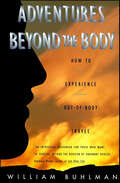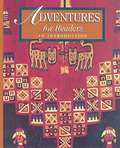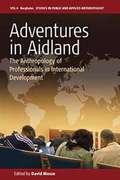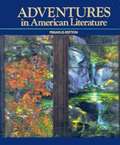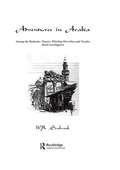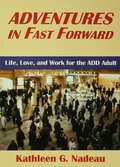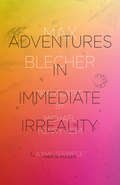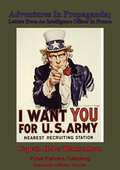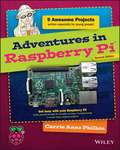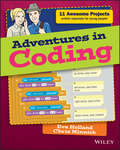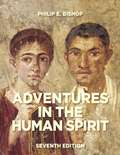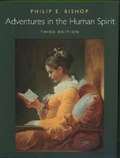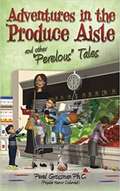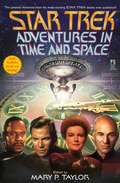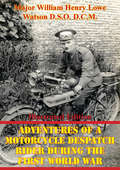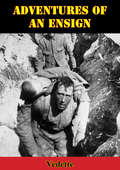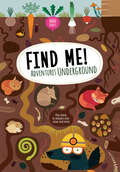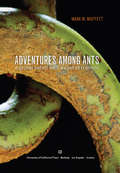- Table View
- List View
Adventures Beyond the Body: How to Experience Out-of-Body Travel
by William BuhlmanExplore new worlds . . .If you ever wondered what might lie beyond the reality we experience every day, if you've ever thrilled to accounts of out-of-body travel and longer to go alone for the ride, this fascinating, practical guide is for you. America's leading expert on out-of-body travel tells the riveting story of his travels to other realms and offers easy-to-use techniques to guide you on your journey of a lifetime'and beyond.Travel into parallel realities . . .William Buhlman has trained out-of-body travelers in his workshop for more than a decade, teaching people how to project their consciousness outside the limits of their physical bodies and to explore dimensions and worlds beyond everyday life. Now he vividly recounts how own adventures in the parallel universe described in the new-physics theories of Stephen Hawkins, Paul Davies, and Fred Alan Wolf and presents his step-by-step guide to astral travel'including exercises, tips, techniques, and answers to your every question about out-of-body experiences.And discover surprising truths about reality, past lives, the soul, and life after death.Astral travel, Buhlman reveals, not only can expand your conscious'it can help verify the existence of the soul, teach you about past lives, and enhance your daily life. Find out in this compelling handbook for everyone who wants to venture beyond the body and take the ultimate trip.
Adventures For Readers, Book Two: Athena Edition
by SafierSequentially outlays poems, short stories, plays plus other literary works as it challenges the minds of the readers to carefully determine the main idea of the selection and exactly what the writer's aim was without having to directly derive from it. It aims at making skilled readers from most readers.
Adventures For Readers: An Introduction (Athena Edition) (Adventures In Literature)
by SafierAdventures For Readers, Adventures In Literature (Athena Edition)
Adventures In Aidland
by David MosseAnthropological interest in new subjects of research and contemporary knowledge practices has turned ethnographic attention to a wide ranging variety of professional fields. Among these the encounter with international development has perhaps been longer and more intimate than any of the others. Anthropologists have drawn critical attention to the interfaces and social effects of development's discursive regimes but, oddly enough, have paid scant attention to knowledge producers themselves, despite anthropologists being among them. This is the focus of this volume. It concerns the construction and transmission of knowledge about global poverty and its reduction but is equally interested in the social life of development professionals, in the capacity of ideas to mediate relationships, in networks of experts and communities of aid workers, and in the dilemmas of maintaining professional identities. Going well beyond obsolete debates about 'pure' and 'applied' anthropology, the book examines the transformations that occur as social scientific concepts and practices cross and re-cross the boundary between anthropological and policy making knowledge.
Adventures In American Literature: Pegasus Edition
by Harcourt Brace JovanovichAdventures In American Literature contains a wide range of American literature, both non-fiction and fiction, from the discovery of the America continent through the latter 20th century. Thematic concepts are traced throughout the book. Analytical and comprehension questions come at the end of each segment, along with specific elements of literary analysis.
Adventures In Arabia: Among The Bedouins, Druses, Whirling Dervishes And Yezidee Devil Worshippers
by SeabrookFirst published in 2001. Routledge is an imprint of Taylor & Francis, an informa company.
Adventures In Chemistry
by Julie T. MillardAdventures in Chemistry engages non-science majors in learning about compelling applications such as forensics, infectious diseases, and the chemistry of art, while also introducing them to the fundamentals of chemistry through clear, concise language. Using the metaphor of a hike as its pedagogical structure, the text presents core concepts and then shows how they apply to contemporary examples. With confidence in their understanding of basic principles, students can use their new chemical knowledge to make well-informed decisions about the foods they eat, the medicines they take, and the lifestyles they pursue.
Adventures In Darkness: The Summer of an Eleven-Year-Old Blind Boy
by Tom SullivanFrom the book jacket: Blind since birth, author and well-known entertainer Tom Sullivan recounts with wicked wit and captivating clarity the hair-raising adventures of his eleventh year in 1950s New England... escaping from his blind school, reliefpitcher in the neighborhood league, and boxing in a backyard bout with the neighborhood bully Adventures in Darkness is a classic tale of boyhood adventure through a formative season, a summer of hilarity and heart, tears and triumph! armed with a daring dream, and the fearlessness and mischief of youth. Tom refused to settle for the conventional confines of his blindness, and set in motion a chain of events that dynamically changed his life forever.
Adventures In Eating
by Clare A. Sammells Helen R. HainesAnthropologists training to do fieldwork in far-off, unfamiliar places prepare for significant challenges with regard to language, customs, and other cultural differences. However, like other travelers to unknown places, they are often unprepared to deal with the most basic and necessary requirement: food. Although there are many books on the anthropology of food, Adventures in Eating is the first intended to prepare students for the uncomfortable dining situations they may encounter over the course of their careers. Whether sago grubs, jungle rats, termites, or the pungent durian fruit are on the table, participating in the act of sharing food can establish relationships vital to anthropologists' research practices and knowledge of their host cultures. Using their own experiences with unfamiliar-and sometimes unappealing-food practices and customs, the contributors explore such eating moments and how these moments can produce new understandings of culture and the meaning of food beyond the immediate experience of eating it. They also address how personal eating experiences and culinary dilemmas can shape the data and methodologies of the discipline. The main readership of Adventures in Eating will be students in anthropology and other scholars, but the explosion of food media gives the book additional appeal for fans of No Reservations and Bizarre Foods on the Travel Channel.
Adventures In Fast Forward: Life, Love and Work for the Add Adult
by Kathleen G. NadeauWritten in response to common questions posed by adults with ADD in the author's clinical practice - and for all adults with ADD, as well as those who care about them - this book is designed as a clear and practical guide for day-to-day life. The author's perspective is one of compassionate realism as she answers specific questions related to understanding and accommodating ADD whether making daily decisions or larger life choices.
Adventures In Immediate Irreality
by Michael Henry Heim Max BlecherOften called "the Kafka of Romania," Max Blecher died young but not before creating this incandescent novel. Adventures in Immediate Irreality, the masterwork of the Romanian writer Max Blecher, vividly paints the crises of "irreality" that plagued him in his youth: eerie and unsettling mirages wherein he would glimpse future events. In gliding chapters that move with a peculiar dream logic of their own, this memoiristic novel sketches the tremulous, frightening, and exhilarating awakenings of a young man.
Adventures In Propaganda; Letters From An Intelligence Officer In France [Illustrated Edition]
by Captain Heber BlankenhornMany of the memoirs from the American Expeditionary Force cover the fighting that raged in 1918: from the shellfire to the wounds, glorious exploits and so forth. What marks Captain Blankenhorn's memoirs as so very different is the role that he served in during the War; he was an intelligence officer in charge of evaluating enemy propaganda and producing Allied propaganda for his own troops and those of the enemy. From posters to handbills, Blankenhorn's efforts whilst lesser known are equally fascinating and meritorious."...illustrations include some interesting samples of German and Allied propaganda. ." p. 214, Edward Lengel, World War I Memories, 2004, The Scarecrow Press, Lanham Maryland, Toronto, Oxford.
Adventures In Raspberry Pi
by Carrie Anne PhilbinCoding for kids is cool with Raspberry Pi and this elementary guideEven if your kids don't have an ounce of computer geek in them, they can learn to code with Raspberry Pi and this wonderful book. Written for 11- to 15-year-olds and assuming no prior computing knowledge, this book uses the wildly successful, low-cost, credit-card-sized Raspberry Pi computer to explain fundamental computing concepts. Young people will enjoy going through the book's nine fun projects while they learn basic programming and system administration skills, starting with the very basics of how to plug in the board and turn it on.Each project includes a lively and informative video to reinforce the lessons. It's perfect for young, eager self-learners--your kids can jump in, set up their Raspberry Pi, and go through the lessons on their own.Written by Carrie Anne Philbin, a high school teacher of computing who advises the U.K. government on the revised ICT CurriculumTeaches 11- to 15-year-olds programming and system administration skills using Raspberry PiFeatures 9 fun projects accompanied by lively and helpful videosRaspberry Pi is a $35/£25 credit-card-sized computer created by the non-profit Raspberry Pi Foundation; over a million have been soldHelp your children have fun and learn computing skills at the same time with Adventures in Raspberry Pi.
Adventures In Scratch
by Chris Minnick Eva HollandLearn to code the "fun" way with nine real projects for true beginners "Adventures in Coding" is written specifically for young people who want to learn how to code, but don't know where to begin. No experience? No problem This book starts from the very beginning to take you from newbie to app-builder in no time. You'll 'learn by doing' as you build projects designed to help you master fundamental programming skills--and you'll have a great time doing it. These skills form the foundation of any programmer's tool set, and you'll continue to use them as you graduate to other devices and more difficult projects. Each chapter includes a video to help clear up any confusion and make sure you "really" understand, so you can keep programming your way through every single project without hitting major roadblocks. If you're ready to start designing your own program, this book will help you get started today. More and more kids are learning to code, and many schools offer basic programming classes as part of the regular curriculum. This book is structured like a class, starting with the basics and building skill upon skill, making it both a perfect accompaniment to formal instruction and an ideal guide for self-study. Learn the basic programming skills you'll use everywhere Build nine fun projects from super-basic to pretty challenging Build the skills you need to create bigger and better apps Watch video tutorials for extra help and explanations How many times have you played with an app only to find yourself wishing it had this or that feature? If you learn how to code, "you" can be the creator of the next big app But it all starts with that first small project. "Adventures in Coding" provides all the information you need, so let's get coding
Adventures In The Human Spirit (Seventh Edition)
by Philip E. Bishop Margaret J. ManosAdventures in the Human Spirit provides a balanced introduction to the major arts, philosophy, and religion. Appropriate for students with little background in the arts and humanities, this single-volume text approaches the humanities by focusing on principal events, styles, movements, and figures. The seventh edition engages students with new chapter-opening spreads, a refreshed color palette, and a clear pedagogical structure. <p><p> New author Margaret Manos maintains the late Philip E. Bishop's approachability to understanding western humanities, bringing the past to life. The new edition continues to contain Bishop's coverage of music, religion, literature, philosophy, and science.
Adventures In The Human Spirit (Third Edition)
by Philip E. BishopExceptionally student-friendly, extensively illustrated, and engagingly thought-provoking, this one-volume historical survey of the humanities is accessible--and inviting--to readers with little background in the arts and humanities. Carefully balanced among the major arts, philosophy, and religion and finely focused on selected principal events, styles, movements, and figures, it brings the past to life by including authentic documents from daily life, comparative global perspectives, and examples from literature, philosophy, music--including the contributions of women and minority artists. For individuals waiting to discover the humanities' rich connections to their own
Adventures In The Produce Aisle: And Other Perelous Tales
by Perel GrossmanPopular humor columnist Perel Grossman shares her not-so-run-of-the-mill experiences as a modern-day; Yiddishe Mama (a.k.a. Jewish Mom) with you, her lucky readers! Join the Grossmans and a whole cast of other characters from; everyone's life; for a rollicking journey around the year and around the block. From the mundane to the madcap, fun and hilarity lurk at every street corner and under each pack 'n play.
Adventures In Time And Space: Star Trek All Series (Star Trek)
by Mary TaylorFrom The Entropy Effect to The Q Continuum, Pocket Books has published hundreds of pulse-pounding, thought-provoking Star Trek novels in the twenty years since Pocket Books US became the official Star Trek publisher. To date there have been 87 Original Series novels featuring Captain Kirk, Mr Spock and their crew; 50 Next Generation novels featuring the Captain Picard and the crew of the Enterprise-D and -E; 26 set on Captain Sisko's space station Deep Space Nine and 18 following the adventures of Star Trek's newest crew on the USS Voyager. Plus there've been numerous unnumbered series novels, five multi-volume crossover series and several movie tie-ins. From this abundance of riches editor Mary Taylor has compiled the ultimate anthology of gripping writing and memorable moments, guaranteed to delight all Star Trek fans.
Adventures Of A Motorcycle Despatch Rider During The First World War [Illustrated Edition]
by Major William Henry Lowe Watson D.S.O. D.C.M.Includes the First World War Illustrations Pack - 73 battle plans and diagrams and 198 photos"A young British soldier who went to war on two wheels"When the Great War broke out, the author of this book decided to leave his university studies and join the struggle. What attracted him immediately was the potential to combine his military service with his love of motorcycles and so it was that he found himself one of a select group of motorcycle despatch riders within the 5th Division of the 'Contemptible Little Army' that went to France and Belgium to halt the overwhelming numerical superiority of the advancing German Army. This book, an account of his experiences in the early months of the war, tells the story of a conflict of fluid manoeuvre and dogged retreat. Together with congested roads filled with military traffic and refugees, the ever present threat of artillery barrage and changing front lines the author had to constantly be aware of the presence of the deadly Uhlans-mounted German Lancers-who were always ready to pitch horseflesh against horsepower."--Print Ed.
Adventures Of An Ensign [Illustrated Edition]
by VedetteIncludes The First World War On The Somme Illustration Pack - 107 photos/illustrations and 31 maps.These are the wartime adventures of "Vedette", a pseudonym of noted journalist and screenwriter Valentine Williams, during the First World War. Williams volunteered for service at the age of 32, a little on the old side for service in as prestigious and hard fighting as the Irish Guards. He was commissioned as a 2nd Lieutenant or "Ensign", and found himself travelling to France and the frontline in 1916. There was little enough time for him to learn his duties and responsibilities in the field before he and his men were thrown into the hell of the Battle of the Somme. The sounds of the shells, bullets and cries of "Stretcher-BearER!" were to become all too familiar to the author before he was wounded and sent back to Blighty. His memoirs are told in the third person, with verve wit and vivid detail that belie William's journalist background.
Adventures Underground (Find Me!)
by Agnese BaruzziGo below with Bernard the Wolf to sniff out hidden objects—from busy ants to buried bones among caves, dens, mines, and more. Bernard the Wolf is back in another thrilling seek-and-find adventure! This time, he&’s digging deep underground with his new friend, Anna the Mole, who&’s showing him around and sharpening his vision. Filled with charming visual puzzles that take place underneath cities, among buried treasure, inside caves, and more, children will have tons of fun while they develop their observation skills and practice drawing conclusions based on what they see with more than a hundred hidden object games! From determining which bat is sad and who is stealing a precious gem to which rabbit&’s tail is different and who has gone into hibernation, Find Me! Adventures Underground is sure to entertain for hours on end! &“Find Me! seek-and-find books are a brilliant way to encourage critical thinking skills for your little one.&” —First Time Parent Magazine This is a fixed-format ebook, which preserves the design and layout of the original print book
Adventures With Waffles
by Guy Puzey Maria Parr Kate ForresterTwo 9-year-olds have many in adventures where they live in Norway.Lena is Trille’s best friend, even if she is a girl. And there is never an ordinary day when you’ve got a best friend like Lena. Hardly a day passes without Trille and Lena inventing some kind of adventure that often ends in trouble. Whether it’s coaxing a cow onto a boat or sledding down the steepest and iciest hill with a chicken, there is always a thrill—and sometimes an injury—to be had. Trille loves to share everything with Lena, even Auntie Granny’s waffles. But when Lena has to move away and Auntie Granny leaves the world, it sometimes seems like nothing will ever be right again. The warmth of friendship and the support of family suffuse this lightly illustrated novel, proving that when times are tough, a little taste of sweetness can make all the difference. (Illustrations described.)
Adventures among Ants: A Global Safari with a Cast of Trillions
by Mark W. MoffettIntrepid international explorer, biologist, and photographer Mark W. Moffett, "the Indiana Jones of entomology," takes us around the globe on a strange and colorful journey in search of the hidden world of ants. In tales from Nigeria, Indonesia, the Amazon, Australia, California, and elsewhere, Moffett recounts his entomological exploits and provides fascinating details on how ants live and how they dominate their ecosystems through strikingly human behaviors, yet at a different scale and a faster tempo. Moffett's spectacular close-up photographs shrink us down to size, so that we can observe ants in familiar roles; warriors, builders, big-game hunters, and slave owners. We find them creating marketplaces and assembly lines and dealing with issues we think of as uniquely human--including hygiene, recycling, and warfare. Adventures among Ants introduces some of the world's most awe-inspiring species and offers a startling new perspective on the limits of our own perception. * Ants are world-class road builders, handling traffic problems on thoroughfares that dwarf our highway systems in their complexity * Ants with the largest societies often deploy complicated military tactics * Some ants have evolved from hunter-gatherers into farmers, domesticating other insects and growing crops for food
